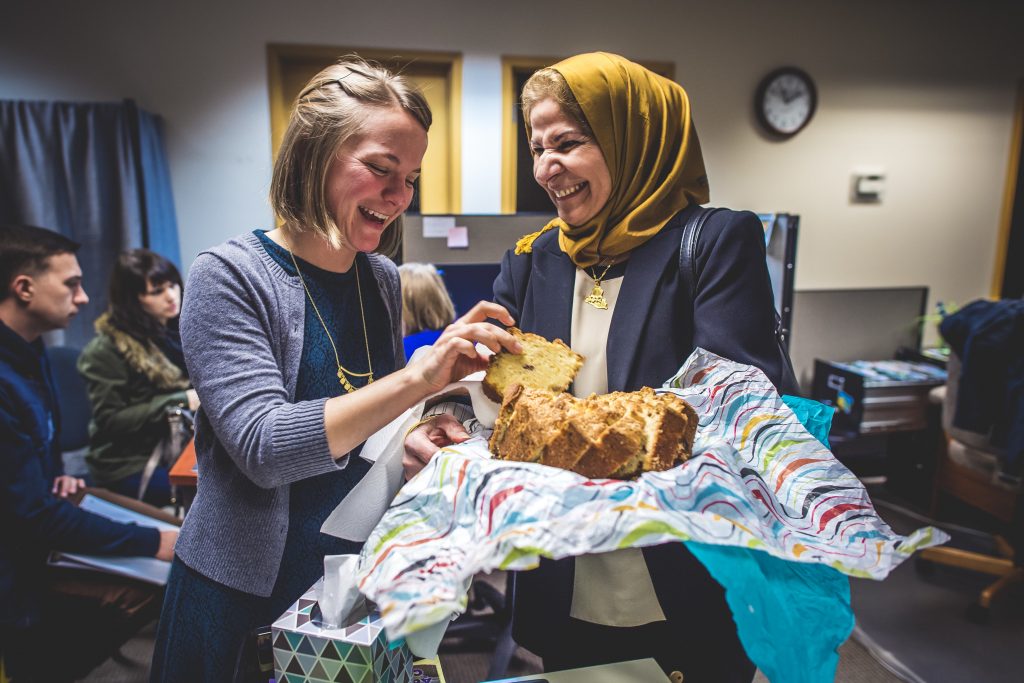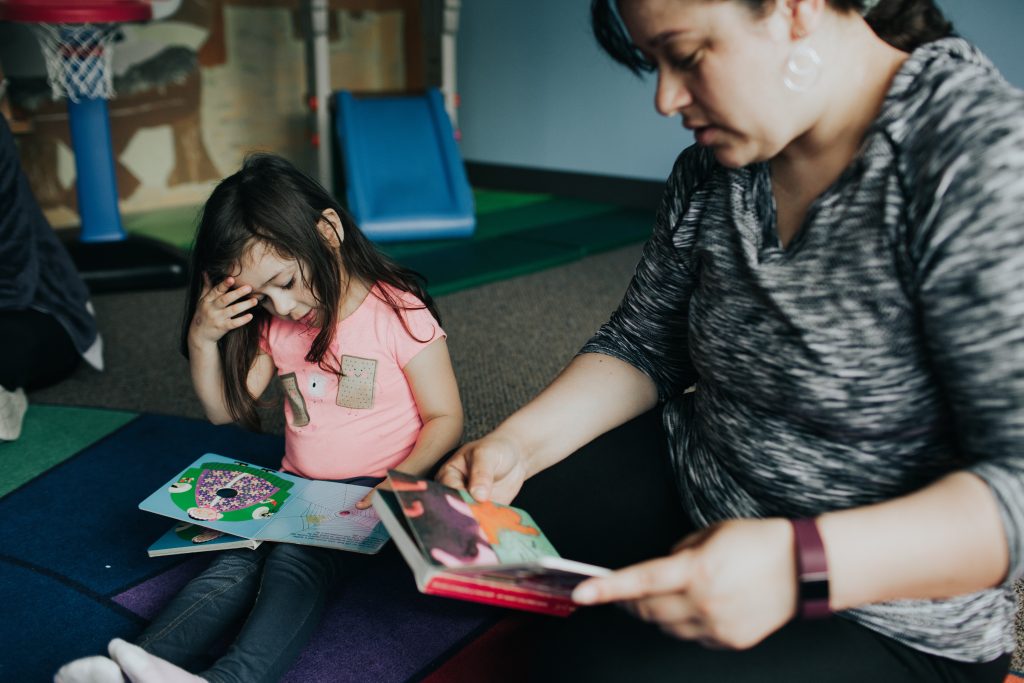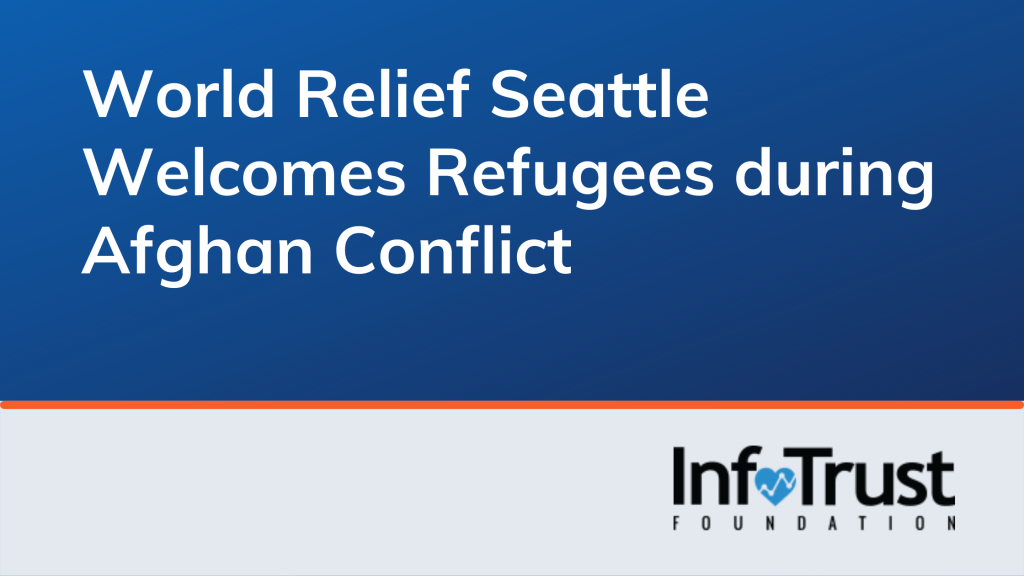While the conflict in Afghanistan may feel far away, the impact is being felt around the world. According to cnbc.com, more than 23,000 Afghan refugees deemed to be “at risk” have arrived in the United States, a number that represents more than one-sixth of all the evacuees airlifted out of Kabul in the past two months. Leaving home for a new country is a large undertaking in and of itself; but add the unimaginable stress and fear that has accompanied the current situation and things are taken to another level.
The InfoTrust Foundation knew there was much to be done from the first reports of contention in Afghanistan and had the opportunity to partner with World Relief Seattle, one of nine U.S. voluntary agencies that have a federal contract for refugee resettlement. We spoke with Executive Director Chitra Hanstad about the organization and how the InfoTrust Foundation is making a difference.
Q: For someone who knows nothing about World Relief Seattle, please tell us about the organization.
A: World Relief Seattle has five “programmatic pillars”:
Welcome Services: include wraparound casework, meeting refugees at the airport, help with housing, employment assistance, cultural orientation, and ESL classes.
Next Generation: includes family literacy class (for pre-K children and their caregivers); refugee youth summer academy (for K-8th); high school environmental science internship (9th-12th); and youth mentorship program (18–24 year olds).
Legal and Justice: our legal clinic is the most robust in our area, the geographic location in which the most diverse and most refugees/immigrants live.
Economic Empowerment: includes a community garden (where 50 families from 23 countries farm with us); Afghan women’s sewing/ESL class; financial literacy classes; digital literacy classes; business support for existing immigrant-owned businesses; and coming soon—a commercial/teaching kitchen and entrepreneurship academy.
Spiritual Care: this work happens at the Immigration Detention Center in Tacoma, WA. The privately run facility is the largest on the West Coast, where people are detained while awaiting their immigration cases. We found out that many of them are people of faith and were being denied their civil liberty to congregate and practice their faith—which was a solace for them while in detention. We advocated with them and now we help find pastors/priests who speak the language requested by the detainees to go in and perform religious services. As a result of our advocacy, there is also an Imam, a Rabbi, and a Sikh Priest that are allowed to go in for religious activities.

Q: What is your vision and hope for World Relief Seattle?
A: Our vision at World Relief Seattle is that every refugee and immigrant would be welcomed by community, rooted in community, and empowered for community.
Q: What makes World Relief Seattle unique and sets it apart?
A: One of the unique things about our office is that it is led by the people it serves. The executive director is an immigrant herself and has real experience, as well as 30 years of working with marginalized communities in the United States and abroad. Immigrants/Refugees/Asylees make up half of our local staff leadership team, as well as the majority of the advisory board. We believe that having people who have lived experience leading an organization makes it more impactful, innovative, and inspiring for those we serve.

Q: What is something about World Relief Seattle that we may not know about?
A: We have welcomed more than 40,000 refugees in our 40 years of being rooted in our community.
Q: Tell us about how InfoTrust’s donation will help your mission at World Relief Seattle. Where will it be going and who will it help?
A: Our greatest need right now is undesignated funding. We have so many people arriving from the Afghan conflict—people who have worked with our troops, our State Department, or the US Embassy. They need to be welcomed well. Our office will receive hundreds more seeking refuge, safety, and home. In order to do that we need to hire up quickly. We need caseworkers, job developers, and ESL professionals. The funding from InfoTrust will allow us to be agile and strategic. It will allow us to be proactive to the needs we encounter. The landscape shifts daily and this funding will help us receive people and set them up for success in their new home.

Q: Your website says you are welcoming and advocating for those in greatest danger. What does that mean to you?
A: As someone who has worked in international development for the majority of my career, I have seen firsthand the dangers of being stateless. Refugees flee danger and then often end up waiting for years in a refugee camp (the average amount of time in a camp is 14–17 years!). Many of the children who grow up in these camps are left without formal education, a sense of purpose, or a future. They face the danger of being trafficked or exploited. We have a chance as a nation to provide a warm welcome. Refugees benefit our economy, our culture, and our collective humanity. Thank you InfoTrust for standing with us as we help provide that place called home.


